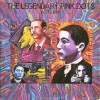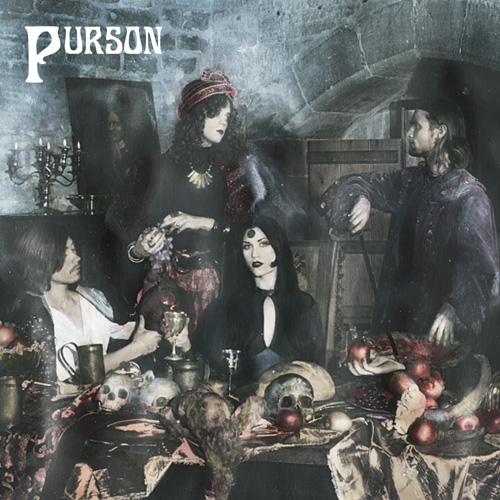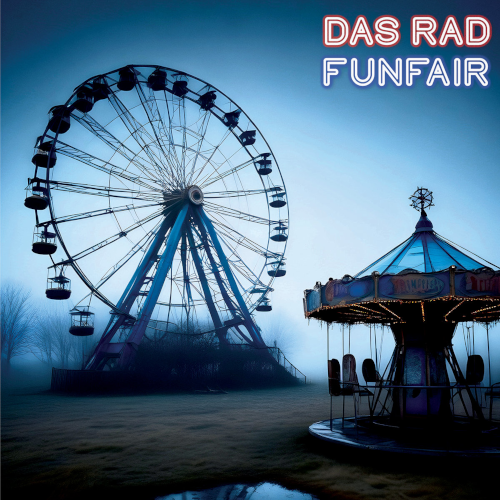 More pleasures from the Legendary Pink Dots archives, re-packaged for your delectation in a lush gatefold slipcase, the original Stephan Barbery artwork given a soft silky sheen. Originally released back in ’85, Asylum was a double opus that almost never was, beset with bizarre dislocations, disappointments and judging by the liner notes threatened the band’s very existence. Luckily things worked out for the best, and out popped a great piece of work that exorcised frustrations and cut the Dots’ cloth for many years to come. It’s a collection that packs quite a depressive punch (as well as weirding you out) — corporal punishment, madness, drug addition, domestic abuse and even a gun-toting sociopath slip through its 78 minutes. But it’s far from GDR grey with Edward Ka-Spel (aka The Prophet Qa’Spel) at the helm playing mischief with misfortune, spinning reason a merry dance, splashing ’round in the puddles of your mind, scenery weaving with that usual slow zeal, banana peeling the plexiglass between your mind and his.
More pleasures from the Legendary Pink Dots archives, re-packaged for your delectation in a lush gatefold slipcase, the original Stephan Barbery artwork given a soft silky sheen. Originally released back in ’85, Asylum was a double opus that almost never was, beset with bizarre dislocations, disappointments and judging by the liner notes threatened the band’s very existence. Luckily things worked out for the best, and out popped a great piece of work that exorcised frustrations and cut the Dots’ cloth for many years to come. It’s a collection that packs quite a depressive punch (as well as weirding you out) — corporal punishment, madness, drug addition, domestic abuse and even a gun-toting sociopath slip through its 78 minutes. But it’s far from GDR grey with Edward Ka-Spel (aka The Prophet Qa’Spel) at the helm playing mischief with misfortune, spinning reason a merry dance, splashing ’round in the puddles of your mind, scenery weaving with that usual slow zeal, banana peeling the plexiglass between your mind and his.
Mixing it up even more, guest star Poison Barbarella (Julia Niblock Waller of Attrition) pens a wonky hallucination of peculating tar babies and distorted bubbles called “Femme Mirage,” full of dark momentums, that fin-fish an operatic vox in tentacles of rotting lace. A long cry from the dark side, something that’s far removed from her other contribution “Agape” (sprinkled further along in the journey), a much softer proposition curling a vivid This Mortal Coil vibe.
There’s some great songs sticking in this album’s ointment too, the first being “The Hill,” a fine ditty that documents a man wiping his alienation away with a gun, shooting down kids at play, a whole year before it became a grim reality with Michael Ryan and the infamous Hungerford massacre. It sends you a chill of hindsight as the chorus skips, “Michael’s got a gun,” the trusty Silverman giving it a whimsical (and unsettling) spit’n’polish, a perverse zaniness with strange guitar spans. Another is “The Prisoner,” a classic LPD nugget whose shifting formula I’ve heard on countless albums ever since, something I’m never going to tire of, an elegant vibe inscribed in the glint of musical bullets. Edward’s lyrics bounce around like blackened blooms of observation, momentarily flying off at the emotional deep end, prising things that little bit wider before snatching them back to obscurity.Sandwiched between are fleeting glimpses into experiment to which “So Gallantly Screaming” adds a massive 11 minutes of spoken word riches set in a burring gravy of tape-sliced randomness, cavalry bugles, baying horses; a lounge clock chiming death nails punching you a ticket to god knows where. A journey zapped in flash floods of abruptness, wrenches that pre-figure all that breakneck “Come to Daddy” jazz by decades. The liner notes state that Mr Stapleton had a hand in the production, something detectable in the sinister opiates oozing from its slanted axis.
After that assault on reason, the Gothic candle wax drips again through a parade of songs that are decidedly odd, full of disquieting texture and rhythm. Firstly the staggered plenitudes of “I’m The Way, The Truth, The Light” with a tongue-curled guitar and popping circus of circuitries transcribing a incarcerated victim, a merciful angel blindfolded bolted to a dungeon floor. “I’ll scream if you kick me,” Edward recites, “I’ll bite through these chains, make you sorry you met me” before dropping to the futility of “till the nurse comes again with her tray full of needles… to dish out the pain again,” a deflated rage aptly caught on a screaming wind. “Golden Dawn”‘s silky Eastern synths, eloquently unbottling its pentagram lovers driving to a lost horizon aglow in Gilmore guitars. The faded grandeur of “Last Straw,” a junky’s demise caught in glinting quartz and rotting harpsichord decadence, Ka-Spel croqueting the words in ever-tightening caricatures, serifs fluttering the architecture like fevered angels.The demonic monologue of “Message From Our Sponsor” and the backward ply of “Go Ask Alice” lead to “This Could Be The End,” the album’s original conclusion. A gerberas of funerality in an organ dirge to a slowly plucked metronome, stretched ligaments of paced delivery painting the final moments of a hangman victim: “Your hair’s pretty neat though your neck snapped in half,” remarks Edward, a vocoder wasping a duality, as the hooded man necks a flask, laughing inside, his face a cold opposite with weird shivers of broken automata haunting a hymn-like vibe. “Your pain is for you alone… as it is… as it was… as it will be,” perspective stretching in “forever, amens” in a subtle macabre of swinging hinges that feel too light to hold a body.
Now, I’m not a fan for bolt-on extras, but “My Baby Likes To Hurt Me” doesn’t distract at all as it launches in a bedlam of screams and sharking instrumentation, the close focus of wordplay turning black humoured abuse into fetishised perversion. Thus closes another chapter from the Dots’ considerable back catalogue, a past that will hopefully continue to catch the light of day for years to come.-Michael Rodham-Heaps-



